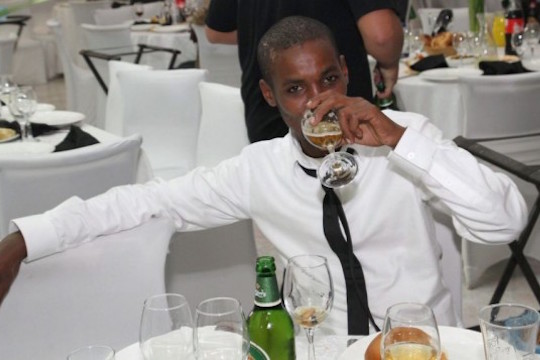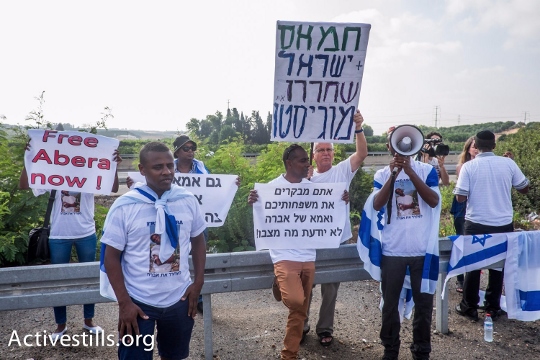Eleven months after the disappearance of two Israeli citizens into Gaza, it seems as if the public has simply forgotten all about them.
By Anat Yorovski
In early July, the Israeli press reported that two Israeli citizens, Avera Mengistu and a Bedouin whose name has not been released for publication, are being held in Gaza, likely under Hamas captivity.
The press followed the story for a number of days, along with a bit of criticism against Prime Minister Netanyahu. And then—silence. The Israeli public has quickly moved on to other things, and I’d like to understand why. I believe that a number of reasons have distracted us from the case of the two missing persons, all stemming from one central feeling critical to the Israeli experience today—complete political despair.
What exactly was the story? IDF soldiers saw Avera Mengistu climb across the border into Gaza in September, 2014. Over the next 10 months, it was kept under a gag order and his family was forbidden from speaking to the press–a family of immigrants requested. For 10 months his parents did not know his condition, where he was, if Hamas was holding him, or whether, at all, he was dead or alive. They also did not know, most importantly, what processes were in motion, or not in motion, in order to bring him back.
And to what extent were they kept updated? A number of days after Avera arrived to Gaza, his parents received the backpack he had left on the Israeli side of the border. The backpack was torn and full of soot, and his parents feared that he had been at the site of an explosion and that he had been hurt.
Only when they were visited ten months later by the prime minister’s coordinator for prisoners-of-war and missing persons, Lior Lotan, did they learn that the bag had been blown up by the IDF, without the presence of Avera. This information was clearly known by the authorities when they had delivered the bag to the family. Yet those responsible for assisting the family simply left it up to them to wonder if their son had been injured. The first time, in fact, that Avera’s parents were invited to an official meeting was the evening before the gag order was lifted, 10 months after the event.
But why does such injustice not merit our attention as a public?
A few guesses. First of all, we simply cannot express solidarity on every issue all the time. We live in a country when at any given time there are at least four emergencies dealing with social, political or economic problems that demand our attention. In the last month we dealt with a stabbing at the gay pride parade in Jerusalem, a murder in the Palestinian village of Duma, and all of the many implications of these two events. We are occupied by the gas deal, the nuclear deal with Iran, among others. All of these happened after the story of two missing Israelis in Gaza.
Conscious people understand that they need to choose the issues on which they need to focus, and while they chose to contest the gas deal, they were unable to also deal with the story of the two missing persons. The less activist-minded feel that the social problems are simply too overwhelming, and that they can just ignore everything. The calls against “incitement” and “oversight” and “robbery” become white noise, since they are heard everywhere and at all times.
Additionally, we are dealing with a situation that is multi-dimensional. When we hear of an Israeli kidnapped by a terrorist we know to be disturbed and to hope that he returns. It directly relates to our fear. We are able to identify, to feel unprotected, and primarily to understand the case in black and white terms.
But that is not what we’re dealing with. We were told that Avera crossed the border by himself, which is hard to believe. Then we learned about another citizen, on whom we have almost no information. The moment that the issue is less clear it’s hard for us to take a stand. I’ve heard rumors that the two men crossed the border in order to buy drugs and, thus, it’s not really necessary for us to make an effort to get them home, and that they are, in any case, not in the hands of Hamas, etc.
Moreover, there is a certain aspect of racism at play. The Israeli consensus does not react to news of a kidnapped Bedouin like it does to a kidnapped Jewish Israeli. I believe that many Israelis would want the Bedouin to be returned home safely, out of the hope that the state would take care of the security of all of its citizens equally. But still, there’s a difference between this desire and the actual getting up and making it happen. When we speak of the missing Bedouin, whose name and story are unknown to most, no one will go out to fight for him.
This is also a question of resources. If one of the men were the son of a veteran Ashkenazi family, the past 11 months would not have looked how they did. Why? Because a veteran Ashkenazi family is perceived differently than an immigrant family from Ethiopia or a Bedouin family. How many journalists, state employees, and security officials would feel connected to such a family, and know him personally, whether it be from the army, studies, or last week’s wedding?
A family from Israel knows how to play the game. They have the right personal telephone numbers to call when their letters to the prime minister go unanswered. They would know to make noise if they choose, and that 10 months without an answer on their missing son is too long to wait. They wouldn’t be afraid to undertake additional steps to get things in motion. We saw how much fear was in the expressions of Avera’s parents when Lotan indicated to them that, by asking questions, they were crossing the line. Would the same have happened with a family whose parents were born and raised in Israel?
The family of the second missing man live in a town in the Negev which suffers from high unemployment and low levels of infrastructure. It is surrounded by two Bedouin villages which for the past years have been threatened with evacuation, and have, time after time, worked to delay the demolitions of their homes. Those villages have never been connected to water or electricity. They are near a farm where an Israeli family has moved into recently, and who were quickly hooked up to the necessary facilitates. This background is important so that we can understand in what context this Bedouin family lives, and what they can expect from the state.
But in my opinion, more than any other reason, we are not speaking about Mengistu and the missing Bedouin because we are, essentially, hopeless. We have no hope in the political system, in our leaders, or in their desire to lead with justice. We feel that there is really no one to fight against injustice. This sensation, one that is too easy to feel these days in Israel, to abandon the fight before we even begin. To tell ourselves that the two men crossed into Gaza because they wanted to, not to think what is happening to them now, to accept the silence around this loaded story.
The writer is an activist and a student of Middle Eastern studies and literature based in Jerusalem. This article was first published in Russian on Relevant Info, and in Hebrew on Local Call. Read it here.



